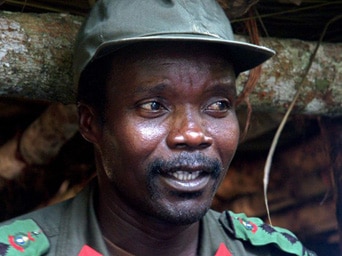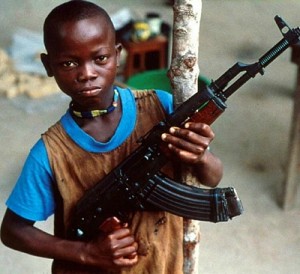
by F. William Engdahl
…. www.engdahl.oilgeopolitics.net
According to their website, the American NGO, Invisible Children, claims now to have had over 80 million viewers to their YouTube video, “Kony2012,” since its release on YouTube a few weeks ago.
For anyone with the patience to sit through the entire YouTube of Kony2012, it is questionable how truthful the figure of 80 million viewers is. Eighty million is unprecedented in YouTube history by all accounts.
The video features such prominent Hollywood personalities as Angelina Jolie, George Clooney, Lady GaGa, Bill Gates, Bill Clinton, Sean “Puff Daddy” Combs and other notables.
It’s a slick, sentimental story directed by Jason Russell, a 33-year-old now-hospitalized American filmmaker who apparently just underwent a bizarre mental disconnect on the streets of San Diego.[1]
The YouTube video depicts a young Ugandan, Jacob Acaye, whom Russell claims he befriended some ten years earlier after Acaye escaped conscription into Joseph Kony’s Lord’s Resistance Army (LRA) as an 11-year-old killer. The film portrays Kony as the world’s worst beast and terrorist, in effect, Africa’s Osama bin Laden. [2]
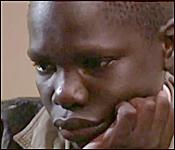
The Invisible Children NGO is itself opaque. It reportedly rakes in millions from sales of such things as buttons, Invisible Children T-shirts, bracelets and posters priced from $30-$250, but it ranks low on transparency regarding other donors.
The group, which employs around 100 people, is expected to raise millions of dollars from their “Kony2012” video, but so far it refuses to say how much has been donated or how it will spend the money.
The founders of the group, who advocate direct US military intervention in response to the LRA, had been previously criticized for posing with guns alongside members of the Sudan People’s Liberation Army (SPLA) in 2008, an organization widely accused of rape and looting.
The group issued a statement in response: “We thought it would be funny to bring back to our friends and family a joke photo. You know, ‘Haha – they have bazookas in their hands but they’re actually fighting for peace’.” [3] HaHa…
According to the London Guardian, Invisible Children’s “accounts show it is a cash-rich operation, which more than tripled its income in 2011” to nearly $9 million, mainly from personal donations. Of this, nearly 25% was spent on travel and film-making. Most of the money raised has been spent in the US, not for Africa’s “invisible children” or even visible ones.
According to information obtained by the Guardian, “the accounts show $1.7 million went to US employee salaries, $850,000 in film production costs, $244,000 in ‘professional services’ – thought to be Washington lobbyists – and $1.07 million in travel expenses.
Nearly $400,000 was spent on office rent in San Diego” Charity Navigator, a US charity evaluator, gave the organization only two stars for “accountability and transparency.” [4] The USAID, a State Department agency which coordinates its foreign interventions with the Pentagon and CIA, openly states on its website that it has funded Invisible Children Inc. in the past. [5]
The bizarre thing about “Kony2012” is that Joseph Kony either fled Uganda or was killed fleeing more than six years ago. It is claimed he fled to the wilds of Congo or Central Africa, hence he makes a perfect echo of the elusive Osama bin Laden, justifying US military action across the rich terrain of central Africa from Uganda to the Democratic Republic of Congo, South Sudan, Central African Republic, Uganda and beyond.[6]
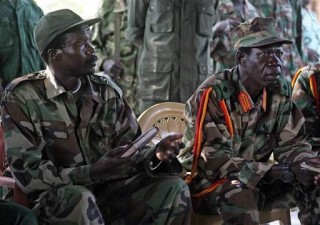
Like Joseph Kony, Osama bin Laden was reliably reported to have died in Afghanistan years before his staged murder by Navy Seals a year ago.
But his legend was kept alive to justify spreading the US War on Terror; so now, with the legend of Joseph Kony propagated by Invisible Children Inc. in San Diego.
The issue is not whether Kony had committed atrocities; that is beyond dispute. The issue is whether “Kony2012” is being falsely promoted to justify US military intervention where it is unwanted by all parties.
One American human rights worker in Uganda in a recent interview declared, “Invisible Children’s campaign is…an excuse that the US government has gladly adopted in order to help justify the expansion of their military presence in central Africa.
Invisible Children are ‘useful idiots’, being used by those in the US government who seek to militarize Africa, to send more and more weapons and military aid, and to bolster the power of states who are US allies. The hunt for Joseph Kony is the perfect excuse for this strategy – how often does the US government find millions of young Americans pleading that they intervene militarily in a place rich in oil and other resources?” [7]
The “Kony2012” video is being credited with giving the US Congress the spur to demand US military forces be sent to not just Uganda, but to the entire region of central Africa where the elusive Kony and his child army warriors are allegedly terrorizing the land.
Democrat Jim McGovern of Massachusetts and Republican Ed Royce have just introduced a resolution in Congress calling on the Pentagon’s AFRICOM (Africa Command) to proceed with “expanding the number of regional forces in Africa to protect civilians and placing restrictions on individuals or governments found to be supporting Kony.” [8]
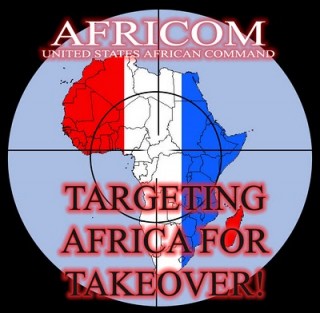
Last year before the “viral” YouTube airing of “Kony2012”, McGovern and Royce also sponsored “The Lord’s Resistance Army Disarmament and Northern Uganda Recovery Act.”
The media attention to the YouTube makes their case easier for military intervention. After all, it’s “humanitarian”; it’s about children, isn’t it?
Even the politically correct Washington Post was moved to write critically, “The very viral campaign to capture Kony by the nonprofit Invisible Children has largely been a U.S. phenomenon. Ugandans say the LRA has not been active for years.” [9]
Already President Obama has sent 100 US elite special forces troops to Central Africa to serve as “advisers” in efforts to hunt down Kony. If it all has echoes of Vietnam in the early 1960’s it is not accidental.
This is now the prelude to a huge Pentagon militarization of the entire region of central Africa, following the NATO destruction of order in Libya, and the chaos in Egypt and other Islamic states targeted by the US State Department’s “Arab Spring,” better termed these days as, “Arab Nightmare.”
“Kony2012” was produced by an apparently well-financed NGO headed by Russell called Invisible Children Inc. in San Diego. The video reeks of US State Department propaganda with its slick camera effects and repeated scenes of Russell’s small boy to make it appear credible.
Rosebell Kagumire, an award-winning Ugandan journalist responded to the clamor over Invisible Children’s “Kony2012” video, accusing Invisible Children Inc. of “using old footage to cause hysteria.” [10] Kagumire adds,
Is it about the dollars or a false belief that unless Americans know about it, no solution comes our way? … the Juba Peace Talks 2006-2008, which restored stability and paved way for the end to abductions in northern Uganda, was not an American invention. It was local civil society and peace actors like the Acholi Religious Leaders Peace Initiatives (ARLPI) who pushed for a negotiated solution.
In fact the moment America got involved, we witnessed “Operation Lightening Thunder”- a military operation with disastrous effects as the LRA eluded air strikes, and scattered into DR Congo and the Central African Republic where they continue to commit atrocities in retaliation.[11]
The entire brouhaha over Joseph Kony appears to be a flank in a major AFRICOM and US State Department campaign especially to undermine Chinese influence in central Africa — now that they have successfully driven the Chinese oil companies out of Libya, and carved out a new “republic” of South Sudan containing much of the oil that fuels China’s economy. That splitting of South Sudan and its oil, for those who did not follow it closely, was a consequence of sending in US and NATO special forces to “stop genocide” in Darfur. George Clooney was also the poster boy for the Darfur action.
There is good reason for the apparent sudden interest of the Pentagon and politicized US NGOs to focus on action in central Africa. So long as the world largely ignored it, Washington policy was to let institutions such as the IMF bleed the countries like Congo and allow western mining companies to extract valuable mineral wealth for pennies on the dollar. A few years ago all that began to change when China turned its attention to Africa, and especially its Great Rift Belt.
Great Rift Belt
The region in question, according to the filmmakers of “Kony2012”, includes not only Uganda where in recent years a giant oil field was discovered, but also some of the planet’s richest mineral lands — including the Democratic Republic of Congo, Central African Republic and the US-sponsored Republic of South Sudan. The area lies in the extraordinary geographical conjuncture called the Great Rift Belt or Valley stretching from Syria in the north, down through Sudan and Eritrea and the Red Sea, and deep into southern Africa across the eastern Congo, Uganda, Kenya, Ethiopia, Somalia and into Mozambique.
This East African Rift System, as geologists term it, is “one of the geologic wonders of the world,” and also prospectively, one of the richest treasures of subsurface minerals, including clearly vast untapped reserves of oil and gas.[12]
The red line on this map shows the eastern and western faults of the Great Rift Valley, which runs 4,500 miles from southern Africa, under the Red Sea, and into Syria in southwestern Asia. it is so huge a geological feature that it is prominently visible to lunar and
space-shuttle astronauts.
Ever since British oil company, Tullow Oil, discovered an estimated 2 billion barrels of oil in Uganda in 2009 the geopolitical importance of the entire central African region suddenly underwent change. CNOOC Ltd., China’s biggest offshore oil explorer, is in a joint venture with Tullow Oil to develop three oil blocks in Uganda’s Lake Albert basin. [13]
According to geologists, “the East African Rift is suspected to be one of the last great oil and natural gas deposits on earth.” In a recent article, Time noted, “Seismic tests over the past 50 years have shown that countries up the coast of East Africa have natural gas in abundance. Early data compiled by industry consultants also suggest the presence of massive offshore oil deposits.” [14]
This region of central and east Africa is considered one of the hottest unexplored regions in the world for potential hydrocarbons—oil and gas. In 2010 Texas oil company Anadarko Petroleum discovered a giant reservoir of natural gas off the coast of Mozambique. Estimates are that Somalia holds perhaps 10 billion barrels of untapped oil.[15]
The chronic political unrest and AFRICOM-backed tensions there—convenient for western oil majors seeking to maintain absurdly high oil prices by controlling supply—prevent the development of the oil. While West and North Africa have undergone tens of thousands of oil well drillings over the last decades, East and Central Africa, including Darfur and South Sudan, Chad, Central African Republic are all but terra incognita in terms of drilling.
This all runs smack up against the popular talk of “Peak Oil.” Far from exhausting the Earth’s resources of oil and gas, oil companies everywhere, from the eastern Mediterranean to offshore Brazil to the Gulf of Mexico and now the Great Rift Belt of eastern and central Africa, are discovering huge new potentials almost daily. We are, as oil economist Peter Odell once noted, not running out of oil, “We’re running into oil.”
Oil is one of the most highly politicized businesses on the planet, and secrecy in the industry among the four giant Anglo-American companies makes the CIA and MI6 look like amateurs. Since the publication in 1956 by Shell Oil geologist King Hubbert of his unproven thesis[16] that oil fields deplete like Gaussian Bell Curves, Big Oil has fostered the myth of looming oil scarcity. It serves an obvious aim of maintaining their grip on the prime energy source for the world economy. Oil and its control is a geopolitical foundation of the post-1945 American Century.
China alters African geopolitical calculus
So long as Africa was the “forgotten Continent” in terms of independent oil and gas explorations, Washington policy was to ignore it. As former South African President Thabo Mbeki recently put it, “Liberated from the obligation to secure the allegiance of independent Africa in the context of its global anti-Soviet struggle, the US had found that Africa was otherwise not of any importance in terms of its global strategic interests.” [17]
But as Mbeki pointed out, by 2007 that all began to change as China began making economic and diplomatic inroads all over Africa: “There was increasing international competition for access to Africa’s oil and other natural resources, including by China. China was becoming a ‘formidable competitor for both influence and lucrative contracts on the Continent.’” [18]
But Washington’s vision of so-called ‘globalization’ of the world economic system allows for no one who does not read from their sheet of music. Hillary Clinton put it clearly enough: “If you’ve got people who are choosing a different path, then you have to use all the tools of your suasion to try to convince them that the path that you wish to follow is also the one that is in their interest as well.”[19] George W. Bush put it more succinctly: “You’re either with us or you’re against us….”
Since China hosted more than 40 African heads of state in 2006 in Beijing, and followed that with highest-level state visits across Africa — with Chinese oil companies and industry signing multi-billion deals with the “forgotten” Africa — Washington suddenly took notice. In 2008 President Bush authorized creation for the first time of a single Pentagon command, AFRICOM, for the African continent.
As Daniel Volman, director of the African security Research Project in Washington stated, “a number of developments—especially the continent’s increasing importance as a source of energy supplies and other raw materials—have radically altered the picture. They have led to the growing economic and military involvement of China, India, and other emerging industrial powers in Africa and to the re-emergence of Russia as an economic and military power on the continent.
In response the United States has dramatically increased its military presence in Africa and created a new military command—the Africa Command or AFRICOM—to protect what it has defined as its “strategic national interests” in Africa. This has ignited what has come to be known as the “new scramble for Africa” and is transforming the security architecture of Africa.”[20]
By 2012 China had become the second largest foreign investor in Uganda after Britain. It is the major investor in the oil resources of South Sudan. In July 2007, the China oil company CNOOC signed an agreement with the Somali government to search for oil in the Mudug region where some estimate that reserves could amount to five to ten billion barrels of oil.[21] The Chinese investments in this part of Africa also include the joint venture which CNOOC signed with Tullow Oil in 2011 for the Ugandan fields. [22]
What is clear is that “Kony2012” is not documentary fact but manipulative propaganda, which is being used to advance an AFRICOM military presence in the richest mineral region in the world before China and perhaps India and Russia preempt it. It hearkens back to the colonial resource wars of the 19th century, with the only difference being the presence of the Internet and YouTube to propagandize it at warp speed.
*F. William Engdahl is author of Full Spectrum Dominance: Totalitarian Democracy in the New World Order. He may be contacted from his website, www.engdahl.oilgeopolitics.net
Editing: Jim W. Dean
Endnotes:
[1] Agence France-Presse, Kony 2012: Uganda PM launches online response, March 17, 2012, accessed in http://www.timescolonist.com/news/Kony+2012+Uganda+launches+online+response/6318818/story.html#ixzz1pNzmSbJC
[2] Jason Russell, Kony 2012, accessed in http://www.youtube.com/watch?v=Y4MnpzG5Sqc
[3] Julian Borger, John Vidal, and Rosebell Kagumire, Child abductee featured in Kony 2012 defends film’s maker against criticism, guardian.co.uk, 8 March 2012, accessed in http://www.guardian.co.uk/world/2012/mar/08/jacob-acaye-child-kony-2012?intcmp=239
[4] Ibid.
[5] USAID, USAID/OTI Uganda Quarterly Report, Washington, DC, January – March 2009, accessed in http://www.usaid.gov/our_work/cross-cutting_programs/transition_initiatives/country/uganda/rpt0309.html
[6] Mike Tuttle, Kony: Ugandan Says He’s Already Dead–Is Movement a Sham?, March 9, 2012, accessed in http://www.webpronews.com/kony-ugandan-says-hes-already-dead-2012-03.
[7] Adam Branch, Dangerous ignorance: The hysteria of Kony 2012, March 12, 2012, accessed in http://www.aljazeera.com/indepth/opinion/2012/03/201231284336601364.html
[8] Stephanie Condon, Joseph Kony resolution introduced in House, March 13, 2012, CBSNews, accessed in http://www.cbsnews.com/8301-503544_162-57396592-503544/joseph-kony-resolution-introduced-in-house/
[9] Elizabeth Flock, Forget Joseph Kony. What Ugandan children fear is the ‘nodding disease,’ March 13, 2012, accessed in http://www.washingtonpost.com/blogs/blogpost/post/forget-joseph-kony-what-ugandan-children-fear-is-the-nodding-disease/2012/03/13/gIQA4Cif9R_blog.html
[10] Rosebell Kagumire, More perspective on Kony2012, March 9, 2012 accessed in http://rosebellkagumire.com/2012/03/09/more-perspective-on-kony2012/
[11] Ibid.
[12] James Wood and Alex Guth, East Africa’s Great Rift Valley: A Complex Rift System, accessed in http://geology.com/articles/east-africa-rift.shtml
[13] Bloomberg News, CNOOC in `Final Discussions’ With Tullow on Ugandan Oil Block Exploration, July 8, 2010, accessed in http://www.bloomberg.com/news/2010-07-08/cnooc-holds-final-discussions-with-tullow-oil-to-cooperate-in-uganda.html
[15] Ibid.
[16] M. King Hubbert, “Nuclear Energy and the Fossil Fuels,” Presented before the Spring Meeting of the Southern District Division of Production, American Petroleum Institute, San Antonio, Texas, March 8, 1956. Publication No. 95. Houston: Shell Development Company, Exploration and Production Research Division, 1956.
[17] Thabo Mbeki, Is Africa there for the taking?, New African, London, March 2012.
[18] Ibid.
[19] Ibid.
[20] Daniel Volman, The Security Implications of Africa’s New Status in Global Geopolitics, Washington DC, accessed in http://ruafrica.rutgers.edu/events/media/0809_media/volman_nai.doc.
[21] Barney Jopson, Somalia oil deal for China, Financial Times, London, July 13, 2007.
[22] Xinhua, China ranks second in investment in Uganda, January 8, 2010, accessed in http://news.xinhuanet.com/english/2010-01/08/content_12773999.htm
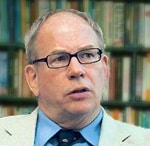
Frederick William Engdahl (born August 9, 1944) is an American writer, economics researcher, historian, and freelance journalist.
He is the author of the best-selling book on oil and geopolitics, A Century of War: Anglo-American Oil Politics and the New World Order. It has been published as well in French, German, Chinese, Russian, Czech, Korean, Turkish, Croatian, Slovenian, and Arabic. In 2010 he published Gods of Money: Wall Street and the Death of the American Century, completing his trilogy on the power of oil, food, and money control.
Mr. Engdahl is one of the more widely discussed analysts of current political and economic developments, and his provocative articles and analyses have appeared in numerous newspapers and magazines and well-known international websites. In addition to discussing oil geopolitics and energy issues, he has written on issues of agriculture, GATT, WTO, IMF, energy, politics, and economics for more than 30 years, beginning the first oil shock and world grain crisis in the early 1970s. His book, ‘Seeds of Destruction: The Hidden Agenda of Genetic Manipulation has been translated into eight languages. A new book, Full Spectrum Dominance: Totalitarian Democracy in the New World Order describes the American military power projection in terms of geopolitical strategy. He won a ‘Project Censored Award’ for Top Censored Stories for 2007-08.
Mr. Engdahl has lectured in economics at the Rhein-Main University in Germany and is a Visiting Professor in Economics at Beijing University of Chemical Technology.
After a degree in politics from Princeton University (USA), and graduate study in comparative economics at the University of Stockholm, he worked as an independent economist and research journalist in New York and later in Europe, covering subjects including the politics of energy policy in the USA and worldwide; GATT Uruguay Round trade talks, EU food policies, the grain trade monopoly, IMF policy, Third World debt issues, hedge funds, and the Asia crisis.
Engdahl contributes regularly to a number of international publications on economics and political affairs including Asia Times, FinancialSense.com, 321.gold.com, The Real News, Russia Today TV, Asia Inc., GlobalResearch.com, Japan’s Nihon Keizai Shimbun, Foresight magazine. He has been a frequent contributor to the New York Grant’sInvestor.com, European Banker and Business Banker International and Freitag and ZeitFragen in Germany, Globus in Croatia. He has been interviewed on various geopolitical topics on numerous international TV and radio programs including Al Jazeera, CCTV and Sina.com (China), CCTV (China) Korea Broadcasting System (KBS), and RT Russian TV. He is a Research Associate of Michel Chossudovsky’s well-respected Centre for Research on Globalization in Montreal, Canada, and a member of the editorial board of Eurasia magazine.
Mr. Engdahl has been a featured speaker at numerous international conferences on geopolitical, GMO, economic, and energy subjects. Among them is the Ministry of Science and Technology Conference on Alternative Energy, Beijing; London Centre for Energy Policy Studies of Hon. Sheikh Zaki Yamani; Turkish-Eurasian Business Council of Istanbul, Global Investors’ Forum (GIF) Montreaux Switzerland; Bank Negara Indonesia; the Russian Institute of Strategic Studies; the Chinese Ministry of Science and Technology (MOST), Croatian Chamber of Commerce and Economics.
He currently lives in Germany and, in addition to teaching and writing regularly on issues of international political economy and geopolitics, food security, economics, energy, and international affairs, is active as a consulting political risk economist for major European banks and private investors. A sample of his writings is available at Oil Geopolitics.net
ATTENTION READERS
We See The World From All Sides and Want YOU To Be Fully InformedIn fact, intentional disinformation is a disgraceful scourge in media today. So to assuage any possible errant incorrect information posted herein, we strongly encourage you to seek corroboration from other non-VT sources before forming an educated opinion.
About VT - Policies & Disclosures - Comment Policy

